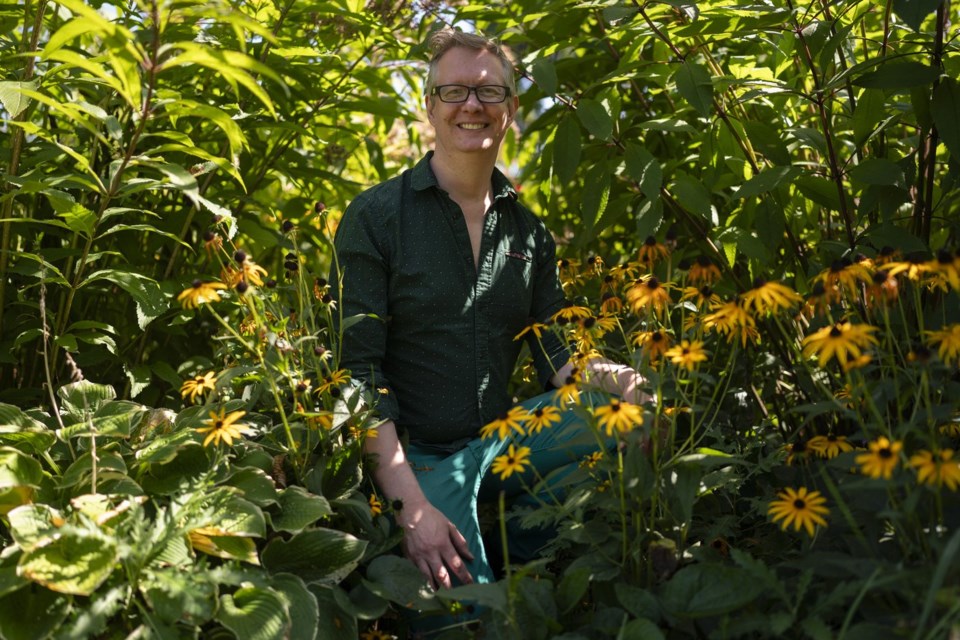Brenda Dyck went rogue for the first time about 40 years ago.
She remembers how she grabbed her gardening tools, marched into a grassy field beyond her rental home, dug a small hole in the ground and planted her first apple tree.
"It was like a dopamine hit for me," says the 61-year-old from her home in British Columbia's remote Cariboo Mountains.
"I've always been a hard-core gardener. I eat, sleep and breathe gardening."
She says she now regularly treks to a community shed near her home to drop off hundreds of seeds she has cultivated over decades to encourage more people to do what she had done — guerrilla gardening.
"Guerrilla gardening is the act of gardening on land that does not belong to you without permission," Dyck says.
"It's revolutionary. Especially in today's climate, there's so many people that don't (own) land or can't afford groceries. It's better for the planet. It's better for communities. It's better for everybody."
Laura Taylor, an urban planning professor at York University in Toronto, says the term was coined in the 1970s in Brooklyn, N.Y.
"The community took over a place where buildings had been taken down because they were unsafe, and then the vacant lot was just left," Taylor says.
The area "went from a place that was an eyesore to a place where people were growing vegetables and getting food from it."
Taylor says it's difficult to track how big the movement is, but it has been persistent since then, mostly in urban areas.
The act comes with risks, she says, as those who garden without permission on land they don't own may be charged with trespassing, especially if the area has a sign that says No Trespassing, or if a gardener has been given a verbal warning to not enter.
Some zoning bylaws, which regulate how a property can be developed, used and maintained, may get rogue gardeners in trouble with the law.
Dyck agrees guerrilla gardening is difficult to track.
"It's such an underground thing, because nobody wants to admit to it."
She says several gentle rebels who don't own land and can't afford groceries but have an itch for gardening have asked her for her seeds.
"If you can't afford potatoes, you can have like three different kinds with my seeds," Dyck says.
She also doesn't have an exact count of how many rogue gardens have sprouted because of her. But she receives hundreds of messages from people every month asking about her seeds, how to plant them and when she will be dropping them off next.
Dyck says she has never got into trouble.
The closest she got was when she went rogue that first time. After the apple tree expanded into a full-blown garden, some growing pots that Dyck had made out of old, broken household items including a vintage radio caught her landlord's attention.
She says she received a letter from the developer asking her to remove her "fairy garden." After she gave him some of her vegetables and promised not to let the plants get in anyone's way, Dyck says the developer was willing to look the other way.
Neighbours who watched her garden grow over the years also appreciated the seeds and fruits she gave out.
Megan Lewchuk, a horticulture technician in Alberta, says she learned about guerrilla gardening last year from a colleague who plants in areas owned by the City of Edmonton.
The 25-year-old says she fell in love with the concept, because she doesn't know whether she'll ever own a home and have her own backyard.
"Opportunities to plant more permanent things in areas I can come back to later is appealing," she says.
Lewchuk says she also deeply cares about the climate. She has planted willows, whose deep roots prevent erosion, without getting permission in Edmonton's ravines.
She has also thrown "seed bombs," which are seeds wrapped in compost and concrete, in urban areas in an attempt to fight the heat island effect. That's when urban areas become several degrees hotter than the average daytime temperature because vegetation has been replaced with concrete.
"Any little difference is still a difference, you know?" she says.
Eric Boyd, a Toronto-based semi-retired investor, says he guerrilla gardens to beautify places around his city with like-minded people.
"It is very gratifying to put something in the ground and then turn it into something beautiful as opposed to the infested space that it was previously," says Boyd.
He isn't worried about getting caught, he says.
"Don't let some fear of the law stop you, OK?
"Neighbours walk by and thank us — is by far the most common outcome."
This report by The Canadian Press was first published Aug. 31, 2024.
Fakiha Baig, The Canadian Press


